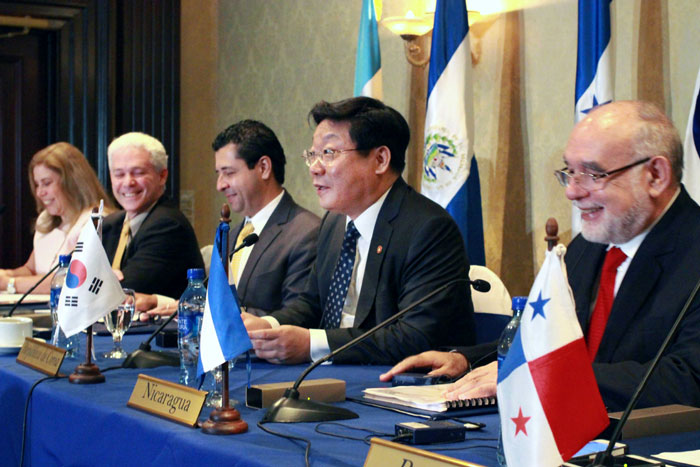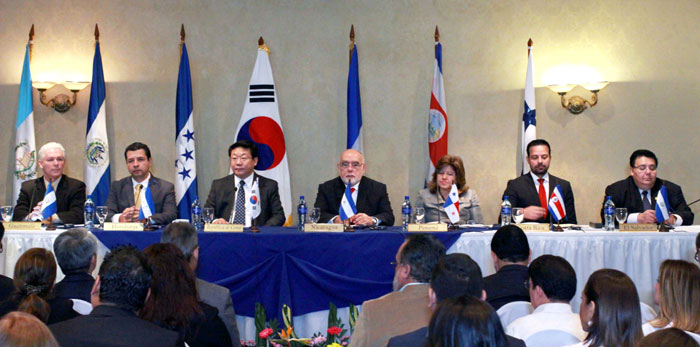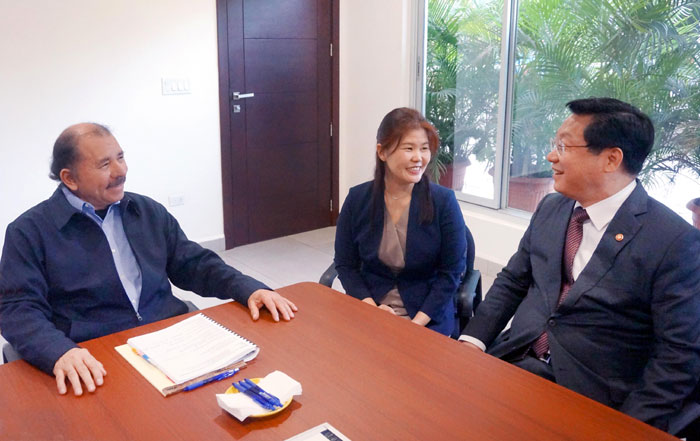
Korea reaches an agreement on a free trade deal with six Central American countries: Guatemala, El Salvador, Honduras, Nicaragua, Costa Rica and Panama. Minister of Trade, Industry and Energy Joo Hyung-hwan (second from right) and ministers from the six countries hold a joint press conference in Managua, the capital city of Nicaragua, on Nov, 16.
Korea and six Central American countries -- Guatemala, El Salvador, Honduras, Nicaragua, Costa Rica and Panama -- have reached an agreement on a free trade deal.
Minister of Trade, Industry and Energy Joo Hyung-hwan officially declared on Nov. 16 in Managua that Korea and the six Central American countries have concluded the Korea-Central America FTA.
Among the Central American nations, five of them agreed to all 24 chapters of the agreement, while Guatemala has made a few exceptions, such as in terms of market approach and areas of origin, but has also reached a de facto agreement.
Thanks to this latest FTA settlement, Korea has become the first Asian country ever to read an FTA with six Central American countries all at once.

Korea and six Central American countries will eliminate tariffs on about 95 percent of goods made in each country, both immediately and in stages. Nicaraguan Minister of Development, Industry and Commerce Orlando Salvador Solorzano Delgadillo (fourth from right) announces the settlement of the Korea-Central America FTA during the press conference on Nov. 16 in Managua.
Under the agreed deal, Korea and its six Central American counterparts will eliminate tariffs on about 95 percent of goods made in each country within 10 years after the pact takes effect. The free trade pact also includes market opening in sectors that Korea mainly exports, such as automobiles, steel and synthetic resins. It will also open their markets for cosmetics, pharmaceuticals, aloe drinks, textiles and car parts, all likely to help Korean companies to a large degree.
Korea will open its markets for items exported from the Central American partners to the same level as it has done with previous free trade pacts, such as Colombia. These items include coffee, raw sugar, and tropical fruits like bananas and pineapples. Korea will also lower tariffs on selected items such as beef, pork and frozen shrimp over the long term. However, some sensitive, domestic agricultural products, such as rice, chili, garlic and onions, were exempt from the negotiations.
In the services and investment sectors, Korea and the six Central American neighbors agreed to adopt a negative liberalization system in order to open their service markets to a higher level than that at the WTO, and boost access to the entertainment, distribution and construction markets.
As part of the Korea-Central America FTA, Korea and its six partners agreed to introduce clauses for investment liberalization and for investor dispute settlement systems in order to replace existing bilateral investment treaties.
This latest FTA will open the markets for government procurement, too, which will help Korean firms enter the energy, infrastructure and construction sectors in those countries.
The FTA partners also agreed to improve the business environment by removing non-tariff barriers. They agreed on rules of areas of origin and customs procedures.
The FTA also formed a framework for effective protection in the content industry and bolstered cooperation on the joint production of content.
Korea and its six Central American counterparts agreed to take systematic measures to protect intellectual property rights by putting a ban on illegal distribution of online TV shows, movies, music and other forms of copyrighted works.
Minister of Trade, Industry and Energy Joo Hyung-hwan valued the free trade pact, saying, “Despite BREXIT and the anti-trade sentiment shown in the U.S. presidential election, Korea and the six Central American countries reached an agreement for a free trade pact within a relatively short period of time, which shows a good model that reminds the world of the importance of free trade.”
In regard to the investment environment, Minister Joo said, “This latest FTA with Central American economies that hold great growth potential helped Korea secure regional markets and obtained a strategic stronghold for market penetration.”
“The free trade deals will help extend the trade and investment volume between Korean firms, including small- and medium-sized enterprises, and our Central American partners,” he said.

Minister of Trade, Industry and Energy Joo Hyung-hwan (right) meets with Nicaraguan President Daniel Ortega Saavedra on Nov. 15 in Managua. They discussed the Korea-Central America FTA and business cooperation between Korea and Nicaragua.
On Nov. 15, Minister Joo met with Nicaraguan President Daniel Ortega to discuss the Korea-Central America FTA and the future direction of cooperation between Korea and Nicaragua.
Nicaragua is the chair country of the Secretariat for Central American Economic Integration (Secretaría de Integración Económica Centroamericana, SIECA). The SIECA is also known as the Central American Integration System, which involves six member states, including Nicaragua, Costa Rica, Guatemala, Honduras, El Salvador and Panama.
Minister Joo told President Ortega that, “The Korea-Central America FTA will bring a win-win outcome for all, as Korea and the Central American nations have mutually beneficial economic and industrial structures, by greatly expanding and diversifying bilateral trade.”
President Ortega responded by saying that, “Central American countries have been eyeing Korea’s economic growth. In the future, this FTA will become the beginning point for a future-forward, cooperative relationship for both sides.”
The Nicaraguan president hoped that the FTA could help lead to more Korean firms investing in his country, especially in sectors such as textiles, clothing, IT, construction, agriculture and marine products, in which Korean firms hold advanced technology and know-how.
The Nicaraguan leader also hoped that both Korea and Nicaraguan could boost cooperation by combining excellent marine and agricultural resources in Nicaragua with Korean technology, capital and global marketing capability, so that they could jointly enter third markets.
Finally, Minister Joo and President Ortega agreed to work together in order to strengthen cooperation on various sectors, such as renewable energy and infrastructure, as well as manufacturing, agriculture and fisheries, so that both countries could form a comprehensive, strategic partnership.
By Yoon Sojung
Korea.net Staff Writer
Photos: Ministry of Trade, Industry and Energy
arete@korea.kr
Most popular
- 2 Egyptian sisters reflect on 10 years as Honorary Reporters
- Korea Welcome Week for foreign tourists set from April 25-May 16
- Korea.net welcomes 2025 K-influencers, Honorary Reporters
- Actor Bae Doona's first romcom in decade to hit theaters in May
- 2025 Honorary Reporter class pledges to spread 'real Korea' worldwide
